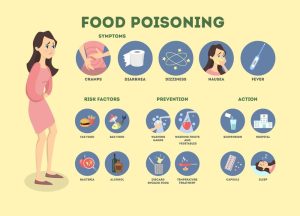Introduction
In the hustle and bustle of modern life, ensuring food safety often takes a backseat. Yet, the consequences of neglecting this crucial aspect of daily living can be dire. From mild discomfort to severe illness, the quality and handling of our meals play a significant role in our well-being. This article aims to empower you with the knowledge and tools necessary to navigate food-related illnesses with confidence.
Understanding Foodborne Illnesses
Foodborne illnesses, commonly known as food poisoning, stem from consuming contaminated food or beverages. Bacteria, viruses, parasites, or toxins present in these items can wreak havoc on our digestive systems, leading to a range of symptoms such as nausea, vomiting, diarrhea, abdominal pain, and fever. Explore more About (Eye Surgery)
Common Culprits
- Bacteria: Pathogens like Salmonella, E. coli, and Listeria are frequently implicated in foodborne outbreaks. Improper handling, storage, or cooking of food can facilitate their growth and transmission.
- Viruses: Norovirus and hepatitis A are examples of viruses that can contaminate food, often through infected food handlers or unsanitary conditions.
- Parasites: Protozoa like Cryptosporidium and Giardia can be present in contaminated water sources, while helminths such as tapeworms and roundworms may infect undercooked meat or fish.
- Toxins: Toxins produced by certain bacteria, such as Staphylococcus aureus or Clostridium botulinum, can contaminate food if not handled or stored properly.
Symptoms and Severity
The symptoms of foodborne illnesses can vary widely depending on the causative agent and individual susceptibility. While some cases resolve on their own with minimal discomfort, others may necessitate medical intervention and hospitalization, especially in vulnerable populations such as the elderly, young children, pregnant women, and immunocompromised individuals.

Prevention is Key
Safe Food Handling Practices
- Clean: Thoroughly wash hands, utensils, and surfaces before and after handling food to prevent cross-contamination.
- Separate: Keep raw meats, poultry, seafood, and eggs separate from other foods to avoid cross-contact.
- Cook: Use a food thermometer to ensure that meats reach safe internal temperatures, killing harmful bacteria.
- Chill: Refrigerate perishable foods promptly to slow bacterial growth and prevent spoilage.
Mindful Consumption
- Read Labels: Check expiration dates and storage instructions before purchasing and consuming food items.
- Avoid Risky Foods: Exercise caution with raw or undercooked meats, unpasteurized dairy products, and uncooked eggs.
- Stay Hydrated: Adequate hydration can help flush out toxins and alleviate symptoms of food poisoning.
- Listen to Your Body: If you suspect foodborne illness, seek medical attention promptly to prevent complications.

Empowering Choices
By prioritizing food safety and adopting proactive measures, you can minimize the risk of foodborne illnesses and enjoy your meals with peace of mind. Remember that knowledge is your greatest ally in safeguarding your health and well-being.
Food Safety Practices
| Practice | Description |
|---|---|
| Clean | Thoroughly wash hands, utensils, and surfaces. |
| Separate | Keep raw meats, poultry, seafood, and eggs separate. |
| Cook | Use a food thermometer to ensure safe cooking temperatures. |
| Chill | Refrigerate perishable foods promptly. |
| Read Labels | Check expiration dates and storage instructions. |
| Avoid Risky Foods | Exercise caution with raw or undercooked items. |
| Stay Hydrated | Drink plenty of fluids to stay hydrated. |
| Seek Medical Attention | Consult a healthcare professional if symptoms persist. |
Conclusion
In conclusion, prioritizing food safety is essential for maintaining optimal health and well-being. By adopting safe food handling practices and making mindful consumption choices, you can reduce the risk of foodborne illnesses and enjoy your meals with confidence. Stay informed, stay vigilant, and savor each bite knowing that you’ve taken the necessary steps to protect yourself and your loved ones.









